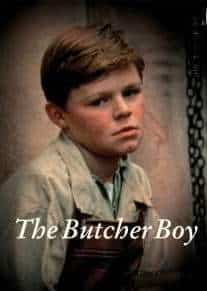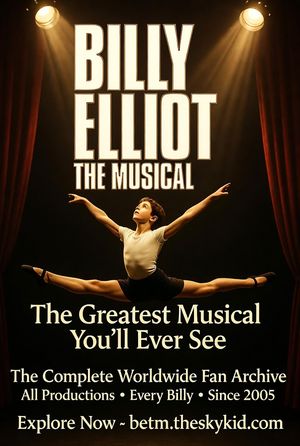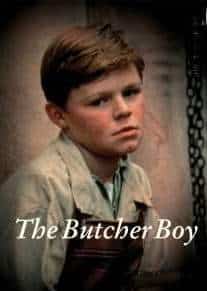 “I really don’t know how people are going to react to this film. I haven’t got a clue. Anyone who’s seen it has been tremendously excited by it. They get either so blown away by it they can’t talk, or else they talk too much. It seems to affect people very profoundly.” 1
“I really don’t know how people are going to react to this film. I haven’t got a clue. Anyone who’s seen it has been tremendously excited by it. They get either so blown away by it they can’t talk, or else they talk too much. It seems to affect people very profoundly.” 1
I chose to open this review with this quote from the movie’s director, Neil Jordan, as it really sets the tone for what you are about the read in the lines to follow.
If you are looking for an unusual coming of age film, The Butcher Boy (1997) would be an excellent choice. The premise can be described as coming of age — gone wrong. I would say that it’s not suitable for anyone under sixteen, as it features spicy language (nothing too offensive by European standards at least) and references.
When I was a young lad, 20 or 30 or 40 years ago, I lived in a town where they were all after me on account of what I had done on Mrs. Nugent.
The movie is an adaptation of the 1992 novel by Patrick McCabe. Francis Brady (Eamonn Owens) is a twelve-year-old boy who finds an escape from the troubles at his home in his active imagination and his best friend Joe (Alan Boyle). His life is filled with comic books, Flash Bars, and John Wayne movies. In fact, everything in his life would have been fine if it wasn’t for his alcoholic father, mentally unstable mother and, last but not least, his biggest enemy – Mrs. Nugent, their neighbor.
Francis’s attempt to pay her back for her snobby behavior (she takes great pleasure in calling him and his family pigs) – gets him into trouble when he is caught breaking into the neighboring house. He’s sent to a reformatory school run by the Catholic Church.
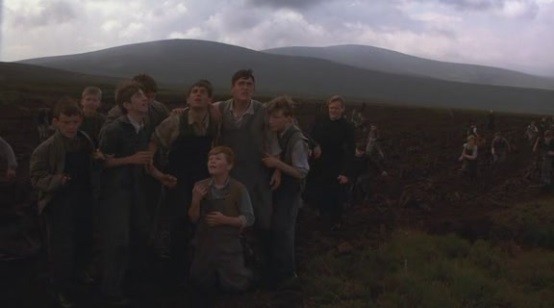
Miracles still happen
There he experiences various things and miraculously changes from a hooligan (or really just a mischievous kid) into an altar boy. His motivation is simple – he misses his best friend and hopes that the happy old times will return. Yet, once he manages to return to the city – he discovers that things have changed: his mother has committed suicide, his father is seriously ill and the person who he considered to be his best friend, Joe, has befriended the son of Mrs. Nugent – the enemy.
Everyone has been a child. And everyone has lost something. Or somebody…
Joe’s betrayal very deeply hurts Francis. Without a doubt, his friend changed under pressure by his parents and other “concerned” adults who thought that Francis was a “bad influence” on their children. When Francis’s father dies, the boys keep his body in the house for several days before the authorities break in. Faced with being left alone in the world, his reaction is one of further detachment from reality and uncontrollable brutality…
The story is told from the boy’s point of view, with the help of a subtle voice over commentary used to illustrate his thoughts. All the actors speak with strong Irish accents – which makes following the dialogue quite challenging, but without lessening the enjoyment of the expressions used. Yet the second time I watched the film, I turned the closed captioning on and discovered many details that had escaped me when I first saw the film. The film’s cinematography is excellent and features a wide variety of viewpoints, panoramic shots, location photography and even fantasy sequences used to display Francis’s imagination.
The acting of Eamonn Owens is believable and resourceful. While it does not provoke the emotional response of the similarly themed movie The Boy Who Cried Bitch, the young lead outperforms many established adult and child actors – despite having no previous filming experience. His charisma will win many viewers over to his side (forgiving him for all of the childhood pranks he pulls). But whether you choose to sympathize with him, or despise his behavior, is a choice that you will have to make on your own.
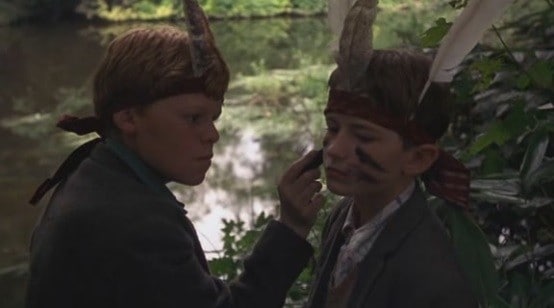
Friendship (Eamonn Owens and Alan Boyle in The Butcher Boy)
Another strong side of the film is the creative directing of Neil Jordan. One has to see the film to note the difference between his style and the mainstream time-wasters that flood the cinemas nowadays. Experienced in the field of the psychological thriller and drama, his efforts make The Butcher Boy one of the best films I’ve ever seen in its genre. Addressing serious and sensitive themes often results in a controversial and disturbing work of art — and The Butcher Boy is no exception. The first part of the film does not offer any surprises for those of you who expect to see a coming of age drama with its usual attributes (a focus on the adventurous spirit of youth, friendships and even some social issues). Its second part, although increasingly intriguing and challenging, chronicles young Francis’s loss of innocence and chilling descent into madness. Even the film’s imperfections are turned into a twisted kind of satire.
I really enjoyed the film and don’t hesitate to recommend it highly to the readers of theskykid.com. The action is swift, the mood changes often and the viewer is always kept engaged with the story. The film is controversial and distributing – and yet a true masterpiece in the coming of age genre.
The film is included in the New York Times – The Best 1,000 Movies Ever Made
1.The Provocative Son published at the The Irish Film & Television Network (link)
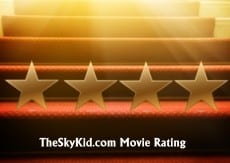 Film title: The Butcher Boy
Film title: The Butcher Boy
Release year: 1997, Warner Bros
Director: Neil Jordan
Cast: Eamonn Owens,Alan Boyle,Andrew Fullerton, Rosaleen Linehan,Ian Hart,Peter Gowen and others
